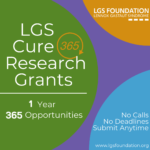2015 Grant Recipient – Candice Myers
Identifying Genetic Causes of LGS
Candice Myers, PhD
University of Washington
Highlights:
- Performed whole-genome sequencing on 197 patients with DEE to identify de novo mutations
- Provide a causal link between DEE and the following genes: NTRK2, GABRB2, CLTC, DHDDS, NUS1, RAB11A, GABBR2, and SNAP25
- Established a molecular diagnosis in 63/197 (32%) individuals in our cohort, with inherited mutations (6/63 cases) and de novo mutations (4/63 cases).
Results: Pending
Lay Abstract:
Developmental and epileptic encephalopathy (DEE) is a group of conditions characterized by the co-occurrence of epilepsy and intellectual disability (ID), typically with developmental plateauing or regression associated with frequent epileptiform activity. The cause of DEE remains unknown in the majority of cases. We performed whole-genome sequencing (WGS) in 197 individuals with unexplained DEE and pharmaco-resistant seizures and in their unaffected parents. We focused our attention on de novo mutations (DNMs) and identified candidate genes containing such variants. We sought to identify additional subjects with DNMs in these genes by performing targeted sequencing in another series of individuals with DEE and by mining various sequencing datasets. We also performed meta-analyses to document enrichment of DNMs in candidate genes by leveraging our WGS dataset with those of several DEE and ID series. By combining these strategies, we were able to provide a causal link between DEE and the following genes: NTRK2, GABRB2, CLTC, DHDDS, NUS1, RAB11A, GABBR2, and SNAP25. Overall, we established a molecular diagnosis in 63/197 (32%) individuals in our WGS series. The main cause of DEE in these individuals was de novo point mutations (53/63 solved cases), followed by inherited mutations (6/63 solved cases) and de novo CNVs (4/63 solved cases). De novo missense variants explained a larger proportion of individuals in our series than in other series that were primarily ascertained because of ID. Moreover, these DNMs were more frequently recurrent than those identified in ID series. These observations indicate that the genetic landscape of DEE might be different from that of ID without epilepsy.
 The LGS Foundation accepts unsolicited proposals year-round to seed new basic, translational, and clinical research projects on LGS. Projects may be funded at the $25,000, $50,000, or $75,000 level.
The LGS Foundation accepts unsolicited proposals year-round to seed new basic, translational, and clinical research projects on LGS. Projects may be funded at the $25,000, $50,000, or $75,000 level.
Updated 01/09/25 (KK)

